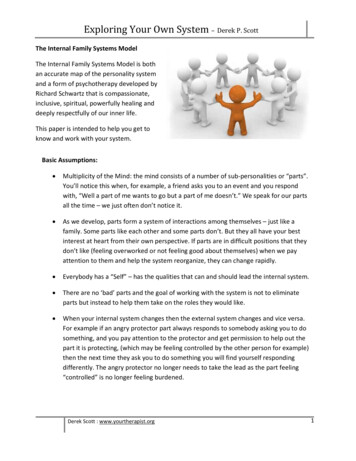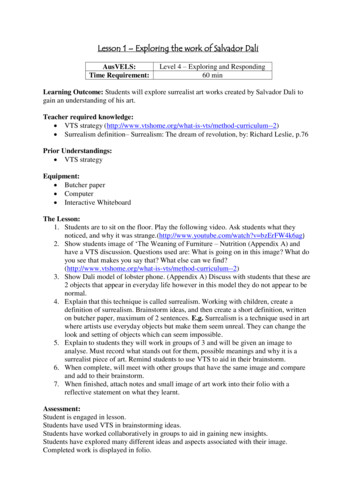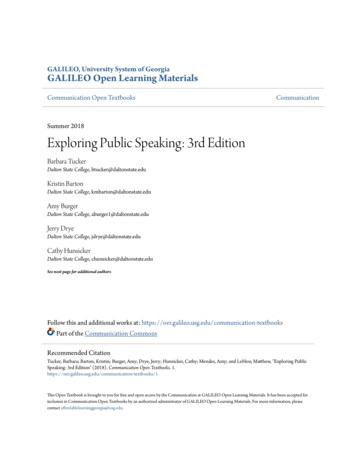
Transcription
Exploring Your Own System – Derek P. ScottThe Internal Family Systems ModelThe Internal Family Systems Model is bothan accurate map of the personality systemand a form of psychotherapy developed byRichard Schwartz that is compassionate,inclusive, spiritual, powerfully healing anddeeply respectfully of our inner life.This paper is intended to help you get toknow and work with your system.Basic Assumptions: Multiplicity of the Mind: the mind consists of a number of sub‐personalities or “parts”.You’ll notice this when, for example, a friend asks you to an event and you respondwith, “Well a part of me wants to go but a part of me doesn’t.” We speak for our partsall the time – we just often don’t notice it. As we develop, parts form a system of interactions among themselves – just like afamily. Some parts like each other and some parts don’t. But they all have your bestinterest at heart from their own perspective. If parts are in difficult positions that theydon’t like (feeling overworked or not feeling good about themselves) when we payattention to them and help the system reorganize, they can change rapidly. Everybody has a “Self” – has the qualities that can and should lead the internal system. There are no ‘bad’ parts and the goal of working with the system is not to eliminateparts but instead to help them take on the roles they would like. When your internal system changes then the external system changes and vice versa.For example if an angry protector part always responds to somebody asking you to dosomething, and you pay attention to the protector and get permission to help out thepart it is protecting, (which may be feeling controlled by the other person for example)then the next time they ask you to do something you will find yourself respondingdifferently. The angry protector no longer needs to take the lead as the part feeling“controlled” is no longer feeling burdened.Derek Scott : www.yourtherapist.org1
Exploring Your Own System – Derek P. ScottBy paying attention to your system you can: Feel more balanced and easy by recognising your parts; at the same time sharing yourSelf (Courage, creativity, clarity, compassion etc.) with them Guide parts to release burdens/difficult experiences and transform into their preferredroles in the system. Improve the quality of your relationships as you bring more Self to them.IFS Concepts: SelfSelf exists in everyone. It is present at birth – distinct fromparts. It is the aspect of our being that is free of ego.Self is the seat of consciousness, of who we are and has thequalities of a natural leader. It is the place from which wecan watch, experience and be with the parts and with otherpeople in an easy and relaxed way.When we recognise and come from our Self we have thequalities of calmness, curiosity, connectedness, confidence,creativity, courage and clarity. When you consider peopleyou admire and feel supported by they probably show a lotof Self energy in their relationship with you.Derek Scott : www.yourtherapist.org2
Exploring Your Own System – Derek P. ScottParts: Sub‐personalities/aspects of our personality Interact inside in ways that aresimilar to the ways that peopleinteract externally. Some like eachother and some don’t and they allact in ways they consider good foryou – unless they are exiled and indistress. They are experienced in a number ofways – thoughts, feelings,sensations, images, sounds, physicalsymptoms. All want something positive for you and will use different strategies to get yourattention (showing up as depression, making you “space out”, doing addictive things,bursts of feelings, telling you that you “should” be different from how you are etc.) They are organized to protect you (Self) and to do so may take on extreme roles byeither dominating or hiding (protectors). Some, like the Exiles, hold the burdens of painand vulnerability. Protective parts are referred to as either Managers or Firefighters depending on if theyare proactive (trying to stop a vulnerable part from being activated) or reactive (tryingto distract from a vulnerable part that has been triggered). Exiled parts are often young parts holding extreme feelings and/or beliefs that becomeisolated from the rest of the system (such as “I’m worthless”).Derek Scott : www.yourtherapist.org3
Exploring Your Own System – Derek P. ScottManagers:These are the parts that are pro‐active and run your day‐to‐day life .They seek to maintain balance within the system by keeping us incontrol of every relationship and situation in an effort to prevent thefeelings of the exiles ‐ pain, shame, fear of rejection etc. comingthrough and taking us over. They do this in a number of ways: Controlling their environment, the body and others. People pleasing or taking care of others Trying to be perfect Criticising/Evaluating/Judging self and others Avoiding risks/Worrying/Apathy Achieving/Striving/Pressuring Being passive and pessimistic Denial/Numbing/Shutting downThey are experienced or seen in the body as:Holding, containing, rigidity of the body, breath constriction, tension, pain, restrained impulses,body armouring and muscle constriction.They relate to the body by:manipulating (including weight gain or loss), criticizing, neglecting, distorting perceptions,numbing and punishing.Often a manager part will claim to be you (they like to run the show).If you know someone who seems really tight and restricted in their way of being then chancesare they are manager‐led.Derek Scott : www.yourtherapist.org4
Exploring Your Own System – Derek P. ScottCommon Fears of Managers: That the exiles will take over and flood the system. Therewill be no return from the dreaded ‘black hole’. Often this isbased on remembering a time when the exile wascompletely blended and the system was stuck in completeshame or fear. Manager parts say “Never again!” and workhard to prevent that from happening. That getting to know exiles and exploring deeper will‘trigger’ dangerous firefighter backlash. That you will be overwhelmed by the exiles or be repulsed or contaminated by them. That ‘secrets’ the system cannot handle, will become exposed. They cannot see the benefit of going deeper as it invites more pain. They may think thatthey are too damaged to ever get better. Doing internal work will result in unwelcome and possibly dangerous changes inexternal relations.Firefighters:These are the reactive protectors – they are heroic, impulsive, andoften seen as destructive and narcissistic by manager parts. The goalof the firefighter is keep exiles away from you – to distract from orget rid of their feelings.They come into play when the exiles are activated – they distract ordissociate to prevent overwhelm or flooding of the inner system.Managers want you to look good and be approved of, FFs only careabout distracting from the pain of the exile so manager parts areoften in opposition to FFS – disapproving and judging.You can oftenhear the two voices playing out in your head: “You were too wild at that party last night. “ “But I was having fun, what’s wrong with that?” “People will think you’re an idiot ”Derek Scott : www.yourtherapist.org5
Exploring Your Own System – Derek P. ScottEtc, etc. When these two parts are battling it out in your head the exile remains lost – nobody ispaying attention to it.Firefighters may often experience their role as burdensome and may welcome thetransformation to an easier role once they know it is possible.They are often experienced in the body as: anxietypanichyper‐vigilancedigestive problemspainsillnesscravings and impulses.They relate to the body by:attempting to soothe and may use chemical substances, self‐mutilation, numbing, eating andsleeping disorders, sexual acting out, and other strategies to ease the distress coming from theexiled part.Working with Firefighters:Do not try to ‘manage’ them – you may need to address your own fearful Managers whenyou’re getting to know your firefighters. It helps to: Form a compassionate, appreciative relationship with the FF part to let it know you aregenuinely grateful for how it has supported you until now and to negotiate access tothe exile so that you can help both to transform less extreme roles. Look for those parts polarized with the ff parts – usually Manager parts that are criticalof them Negotiate respectfully and remember the power of these parts in the system.Derek Scott : www.yourtherapist.org6
Exploring Your Own System – Derek P. ScottExiles:These are young parts that may have experienced trauma and/orneglect and other overwhelming experiences. They often becomeisolated from the rest of the system for their own protection and forthe system’s protection.They hold the memories, sensations and emotions of difficult eventsand are stuck in the past. When activated Exiles present with extremefeelings and/or beliefs. They can become increasingly desperate intheir effort to be cared for and to have their story told.Once relieved of the burdens that they carry they are usually the most sensitive, vulnerable,playful, innocent, creative and intimacy‐loving parts.Exiles can be experienced or seen in the body as feelings of emptiness, lethargy, depression,shame, pain etc.Exiles may relate to the body by numbing, freezing, immobilizing the body; depleting energyand/or overwhelming with emotion and sensation.Neo‐exiles: These are parts that are exiled by our relationships and may be seen as threateningto our partners.Burdens:These are the beliefs, memories, emotions and sensations that accumulate from pastexperiences. There is often a core belief or wound being held by a part and it is helpful todiscover, “What does this part say about itself?”(e.g. “I’m worthless”) “What was the message it got?”(e.g. A parent saying “I wish I hadn’t hadkids!”) “What meaning did it make of that?”(e.g. “I shouldn’t have been born”)Exiles attempt to tell their story through words, images, behaviours, sensations, movement,dreams, physical symptoms or illness. In the example above you might notice that each timeyou don’t succeed (failing a job interview, breaking up a relationship) this burdened part will tryand get your attention (“I guess I didn’t deserve that job, him/her” etc). Once the story iswitnessed and the full weight of the distress recognised, the burdens can be released.Derek Scott : www.yourtherapist.org7
Exploring Your Own System – Derek P. ScottIFS ProcessAccessing PartsThere are various ways to access your parts: Situational – re‐experience an upsetting situation. You can focus on what happened toconnect with the part(s) that got activated. Emotional – access feelings that are already present. Somatic – locate feeling in the body. Visual/Sensory – describe what feeling looks like – colour, shape, size, density, image? Verbal – access the feeling via message it carries.You may ask yourself:“Is there a part of me that I’d like to get to know better?”“What part is here right now?”“What do I notice in or around my body?” “How do I sense or experience it?”“Does it feel alright to focus on it right now or are there concerns about doing that?”Checking for Self LeadershipOnce you have located a part check the following:“How do I feel towards this part? Do I feel open to it?””“How do I experience the quality of the connection with this part?”“Is there a heart connection there or is something else going on?”“How do I feel as I look at the part?”Being Present:How close are you to the part?How close can you get to the part? Close enough to sense what it is feeling, but not so closethat it overwhelms you?Is it possible to stay very present with this part – no pushing – no rushing – no agenda?Derek Scott : www.yourtherapist.org8
Exploring Your Own System – Derek P. ScottUnblending (if necessary):Blending happens when a part takes you over, often saying it feels like you. Remember: if theexperience of yourself is not that you feel easy, open and relaxed then chances are a part isblending with you (anxious/depressed/annoyed/unhappy etc).Unblending and getting access to Self is the heart of the work, and it isoften difficult to do. Be patient and know that it will become easier.One approach is to remember a time in your life when you felt calm, or asense of inner peace; felt full of love or compassion for someone. You canbegin to separate parts from Self by asking various questions. “Would you separate from me, so that I can look at you and get to know you?” (If this isthe part that you are trying to get to know) “Would you consider stepping back or out of my body into a witnessing role?” (If this isnot the part you are trying to get to know) “What are you concerned might happen if you did step back?”Keep working with your parts and remember that the protectors are serving you. As youappreciate them for their work and reassure them about their concerns they will begin to trustyou.Creating Trusting RelationshipsWhen you are in Self Leadership, you may experience compassion towards the parts that arehurting in some way. If there seems to be sufficient ‘Self’ energy (such as calmness andcuriosity) let the part know: That you are aware of it Who you are (and how old you are) so it doesn’t confuse you with another part That you would you like to send it your acceptance/appreciation/compassion/loveDerek Scott : www.yourtherapist.org9
Exploring Your Own System – Derek P. ScottCheck to see if there are parts in the way of having your heart be open to the part, and if so seewhat their concerns are about you opening to it. Creating trusting relationships in the internalsystem is important.Sometimes a part may be mad at you for not having been around or feel like it doesn’t andcan’t trust you. Often this will activate other parts that want to respond. If so just let themknow you’ve got it covered. A part has every right to not trust or be mad at you. Can you becurious about that?Identifying the Role of the Part:Assess the role/function/purpose of the part you are getting to know by asking: “What is your job? What do you do for me?” “Tell me what you want me to know about you” “Do you like what you are doing and how you do it?” “Can you tell me about when you started doing this?” “What are you afraid would happen if you did not do this job?” “If you did not do this job, is there something else you would like to do?”Addressing Concerns/Fears:Identify and validate what the part is afraid of and offer reassurance that all concerns will beaddressed before proceeding further.“What is the part afraid would happen if .?” (You kept getting to know an exiled part)Offering Realistic Hope:“What if we could do this without your worst fears happening?”“How would it be for this part if you were able to .?”Derek Scott : www.yourtherapist.org(Get to know the other part withoutthe concern being realised?)10
Exploring Your Own System – Derek P. ScottGetting Permission to Work with an Exile:Your manager and firefighter protectors have been around for a long time helping protect youand/or the exiled part. It is respectful to get permission from them to get to know thedistressed part (if it is an exile) by asking: “Is it alright with you (manager/firefighter part) if I get to know this part?” “If I could ensure that I will not get stuck in their pain would you be interested inallowing access to the parts that are feeling (sad, scared, lost etc)” “Would it be okay for to witness while I work with this part?” “If it looks like it may be too much would you be willing to come in and shut down thecommunication?” “If I were to be able to help these parts to feel better would you still have to do whatyou do?” (Sometimes protectors are driven to do what they do (overwork/rage) by thepresence of the exile. Once the exile is unburdened they can choose to do what theyhave always done; but need not be driven to do it. This is often very appealing toprotectors. “What would you like to do instead if you could?”Derek Scott : www.yourtherapist.org11
Exploring Your Own System – Derek P. ScottUnburdening of the Exiles: Check that you feel yourSelf close to the part without blending/flooding. Sometimesexiled parts are so relieved that you are there that they may flood the system with whatthey are holding. You can ask them not to do that as it will only serve to activate yourprotectors which means you cannot stay with them. Let them know that you get howbig the feelings are. As you pay attention to the Exile’s story, memories, feelings and/or sensations and itshows you where it is stuck in the past you can identify and validate its beliefs. If a partwants to minimise, discount, soothe or argue with an exile’s beliefs ask it not to do that.It is important to fully witness what the exile is holding without moving to change it. If it feels right you can enter the past scene and do what the part tells you it needs to bedone. The Exile may need to be removed from an unsafe place and be retrieved into thepresent time. Unburdening ritual: Once the Exile has told you everything about what it is holding youcan invite it to bundle all those worries, concerns, feelings, beliefs etc and to send themaway permanently to light/air/fire/earth/water or anything else. Invite the part to breathe in whatever qualities will help it to move forward now. If the part is no longer stuck in the scene in the past ask it where it would like to settlenow. Parts may want to be with other parts, live in your heart or mind, grow up, stay theage they are but in a better place like a park or playground be open to what the part isseeking and give it your blessing. Check with other parts that may react to the unburdening by inviting any and all partsconnected to the Exile to notice this shift. Invite comments or concerns and address theconcerns (such as, “What do I do now that I’m not protecting this part anymore?”) Thank all the parts that trusted, stepped aside, transformed.In a sense the work here may be regarded as information transfer. The exiles hold distressinginformation in the form of feelings and beliefs that they have taken on. Once they have let youknow everything that has been hard for them they can release it and return to their preferredplace. It is not dissimilar to a child telling a trusted adult about something that worries them,and then once reassured dancing off to play with their friends.Had there been a trusted adult around to reassure the young child at the time it was upset thenit would not have become stuck in the past as an exiled part. Yet now it can be helped.Derek Scott : www.yourtherapist.org12
Exploring Your Own System – Derek P. ScottPolarizationsA polarization occurs when two parts or clusters of partsseemingly operate at cross‐purposes develop an on‐going,escalating power struggle while attempting to control abehaviour, outcome or decision.This escalated inner conflict is typically between parts that areprotecting the system with vastly different approaches. Since virtually all manager activities areconsidered socially acceptable and oftentimes even socially desirable behaviours, even theexternal environment of the family, work and the culture supports and encourages thesebehaviours, as in, “If I work hard, I will get ahead” or “If I am nice to people, they will like me.”This is in contrast to many of the firefighter activities, which are often impulsive and risk‐taking.These behaviours cause concerned managers to want to seek control as they judge thefirefighter activity as wrong and often dangerous. As each side battles to determine which partscan best protect the person’s functioning and best maintain inner stability there is a nearconstant tension within the system.This power struggle can escalate into a cycle of addiction that includes compulsive, repetitivefirefighter behaviours with their characteristic chaotic or impulsive acting out and managersthat are extremely judgmental, fuelling intense inner self‐criticism or self‐loathing. Generally inan addiction cycle, the same protective parts interact over and over again, often without everacknowledging the existence of the sensitive, fragile emotions that are underlying and fuellingthese warring parts; those parts are exiled.How to work with Polarized Parts: Find the different parts in your body Focus on the parts one at a time, letting them know they will both be heard. Reassure the parts that you are not going to collude with one part over another. Explore the concerns of the parts. Have parts share their concerns with each other. Support a Self‐led resolution.The unburdening of the exiles protected by both factions may be necessary for genuinehealing and permanent internal change.Derek Scott : www.yourtherapist.org13
Exploring Your Own System – Derek P. ScottTechniques for getting to know your PartsThere are various ways to get to know your parts.Concretise If they are willing to unblend a little from you then you can choose an object torepresent them. Say for example a young girl part would like your attention, you couldselect a doll, a rock, a piece of wood, whatever she would like and place it (her) in yourhome where you could acknowledge her each dayJournal Another technique is to journal from part to part or part to Self. Divide the page in 2and start the dialogue on the leftMy Dad is driving mehand side, then continue from anothercrazy! I’m going to have topart on the right: This is an example of atell him to back off.Come on be reasonable,firefighter/manager dialogue. Thisthat’s just how he is.conversation has probably occurred manytimes in the system and by putting itWell maybe I’m finallyoutside and perhaps revisiting it the next tired of you excusing him –what’s so wrong aboutday it can become clear how there is anstanding up to him?exiled part connected to these protectorsIf you do that he might getmad at us.(I would assume a young part scared of itsSoWhat?Icanstandupfather’s anger).for myself, I’m an adultEmail You can set up an account for yourparts. For example if someone is driving you crazy and you’re mad at them (your firefighteris triggered) then you can fire off and angry email to your own designated account. Laterwhen the firefighter energy has cooled you can open it, witness the firefighter and perhapsenquire about the exile to which it is connected.Video If you have a webcam you can make short videos for yourself speaking from ablended part. You can then review them later and learn about what that part is holding.3‐D Parts This tool is called the Youniverseand is available from David Cantor atwww.davidcantor.net/ You can move partsaround the Self as you explore yoursystem.You may also use a sandtray ordrawing/painting to become more clearabout your system.Derek Scott : www.yourtherapist.org14
Exploring Your Own System – Derek P. ScottMeditation Some meditation techniques regard thoughts and feelings as distractions to beexcluded from the focus of the meditation. Using meditation to connect with parts differsfrom these techniques. The point here is to bring the attention to the parts.One method is to sit quietly and ask your parts to separate out a bit. If they have a concernabout this then just bring your attention to what their concern may be. If they separate outyou feel expansiveness in your system. When it feels right ask whatever parts would likesome attention to let you know about themselves. Or simply sit and a part will present itselfto you.The CD ‐ "Meditations for Self" by Richard C. Schwartz is available from the Centre for Self‐Leadership (web address A Last WordI hope this handout is helpful to you.For more information about IFS please visit Me (Derek Scott) at www.yourtherapist.org The Centre for Self‐Leadership at www.selfleadership.orgAnd to have a place to talk about your work with your own system check out the FacebookPage: IFS Me and My Parts y‐Parts/181763701840869?v wallDerek Scott : www.yourtherapist.org15
Interact inside in ways that are similar to the ways that people interact externally. Some like each other and some don’t and they all act in ways they consider good for you – unless they are exiled and in distress. They are experienced in a number of ways – thoughts, feelings, sensations, images, sounds, physical symptoms.File Size: 651KBPage Count: 15










